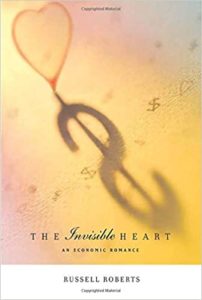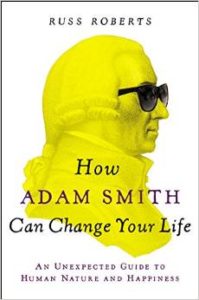What if you had the opportunity to discuss and review some of EconTalk host, Russ Roberts’ published books? Well now might be your chance!
Erik Rostad, host of the podcast Books of Titans, read all of Russ’s books; his experience is the subject of this podcast. Through the duration of the podcast, Rostad discusses The Invisible Heart, The Choice, The Price of Everything, How Adam Smith Can Change Your Life, and Gambling with Other People’s Money. At the end of the segment, Rostad summarizes the most important aspect he wants to remember from this set of books. Give Rostad’s podcast a listen and then answer the discussion questions below, and start a conversation with what you think about the podcast!

1-Rostad starts with a quote from Roberts’ book, The Invisible Heart. The quote is, “There is an invisible heart at the core of the market place, serving the customer and doing it joyously.” He goes on to discuss how this quote illustrates the often unconsidered side of free markets. A very common view of free markets and economic ideology today is that is they are “unkind and selfish.” Do you agree or disagree with this perspective? In what ways do you think that it is or isn’t? If you’ve read The Invisible Heart can you think of any specific examples from the book?
2- In his discussion on The Choice, Rostad reads a quote describing protectionism as a harmful strategy: “Can you imagine how poor America would be in 1960 or 2005 if America had made a decision back in 1900 to preserve the size of agriculture in the name of saving jobs?” This is often an aspect of economics that isn’t considered. Do you think the way that Roberts illustrates this point explains the dangers of protectionism? Can you think of other examples that would illustrate the same point?
3- How Adam Smith Can Change Your Life focuses on Adam Smith’s book The Theory of Moral Sentiments. A main topic of both these books is self-interest vs. selfishness and the line between the two. Do you see a difference between self-interest and selfishness? Do you think you can be self-interested without being selfish? Are there times that the two ideas overlap? Can you think of an example?

4- Rostad discusses the importance of small decisions. He summarizes Roberts’ view that the small decisions we make when no one else is around or when it seems like our choices don’t matter are the most important decisions we make, as they determine the direction our lives move in. This thought process highlights the importance of daily habits that support the small yet important decisions we make every day. In what ways is this relevant to your own life? Do you have any daily habits that you use to guide your decisions consciously or unconsciously?
5- Can you summarize the point that Rostad thinks is the most important out of Roberts’ five books? Given the other content of the podcast (or if you have read some or all of the books), do you think Rostad’s main takeaway is the most important one? Did any other points stick out to you as more important? Explain.


Comments are closed.